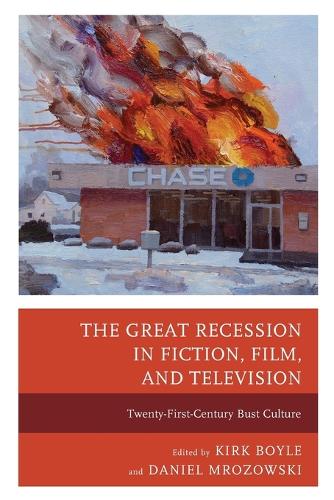
The Great Recession in Fiction, Film, and Television: Twenty-First-Century Bust Culture
(Paperback)
Publishing Details
The Great Recession in Fiction, Film, and Television: Twenty-First-Century Bust Culture
By (Author) Kirk Boyle
Edited by Daniel Mrozowski
Contributions by Rebecca Barrett-Fox
Contributions by Jesseca Cornelson
Contributions by Sarah Domet
Contributions by Maryann Erigha
Contributions by Sarah Hamblin
Contributions by Daniel Mattingly
Contributions by April Miller
Contributions by Lance Rubin
Bloomsbury Publishing PLC
Lexington Books
26th August 2015
United States
Classifications
Professional and Scholarly
Non Fiction
Media studies
Films, cinema
Television
Literary studies: fiction, novelists and prose writers
Literary studies: c 1900 to c 2000
Communication studies
Economic history
791.436553
Physical Properties
Paperback
296
Width 154mm, Height 229mm, Spine 21mm
467g
Description
The Great Recession in Fiction, Film, and Television: Twenty-First-Century Bust Culture sheds light on how imaginary works of fiction, film, and television reflect, refract, and respond to the recessionary times specific to the twenty-first century, a sustained period of economic crisis that has earned the title the Great Recession. This collection takes as its focus Bust Culture, a concept that refers to post-crash popular culture, specifically the kind mass produced by multinational corporations in the age of media conglomeration, which is inflected by diminishment, influenced by scarcity, and infused with anxiety. The multidisciplinary contributors collected here examine mass culture not typically included in discussions of the financial meltdown, from disaster films to reality TV hoarders, the horror genre to reactionary representations of women, Christian right radio to Batman, television characters of color to graphic novels and literary fiction. The collected essays treat our busted culture as a seismograph that registers the traumas of collapse, and locate their pop artifacts along a spectrum of ideological fantasies, social erasures, and profound fears inspired by the Great Recession. What they discover from these unlikely indicators of the recession is a mix of regressive, progressive, and bemused texts in need of critical translation.
Reviews
The Great Recession in Fiction, Film, and Television is a welcome addition the cultural analysis of the 2007 economic meltdown. It is an astutely edited volume that shows how bust culture became a textual emphasis in all manner of productions: film, fiction, television, and art. This is vital reading for those who are interested in how focal economic events become the material of textual expression. -- Stanley Corkin, University of Cincinnati
Author Bio
Kirk Boyle is a visiting assistant professor in the Department of Literature and Language at the University of North Carolina Asheville. Dan Mrozowski is a visiting assistant professor in the English Department at Trinity College in Hartford, CT, where he teaches courses in American literature, critical theory, and crime fiction.
